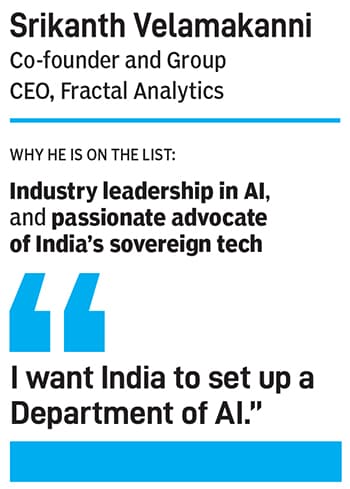Predicting a future where it will be irresponsible to not use AI: Srikanth Velam
Velamakanni, the cofounder and CEO of Fractal Analytics, is one of the faces of India's AI efforts and an outspoken proponent of the need for sovereign AI technologies


In March 2007, a data-crunching model built by Fractal Analytics predicted that West Indies would upstage Pakistan in the first match of that year’s cricket world cup. Correctly.
Co-founder and Group Chief Executive Srikanth Velamakkani has come a long way, as they say, since then, becoming one of the faces of India’s AI efforts and an outspoken proponent of the need for sovereign AI technologies.
Velamakanni’s 25-year entrepreneurial journey began not with a grand plan, but with a desire to build something impactful, he tells Forbes India in an interview. “The key reason behind starting Fractal was I wanted to be an entrepreneur," he recalls.
 He and four other graduates of one of India’s most prestigious business schools, IIM-Ahmedabad, started the company in 2000. For reasons including what Velamakkani himself has candidly described as “just ego" in the past, some of the co-founders parted ways, and Velamakanni remained as the driving force behind Fractal.
He and four other graduates of one of India’s most prestigious business schools, IIM-Ahmedabad, started the company in 2000. For reasons including what Velamakkani himself has candidly described as “just ego" in the past, some of the co-founders parted ways, and Velamakanni remained as the driving force behind Fractal.
Initially, the company had experimented with consumer decision tools, but switched to what would become its core: Using analytics and AI to predict human behaviour in the pursuit of better business decisions. This was inspired by Velamakanni’s two lifelong passions: Mathematics and the study of human behaviour, or psychology. He also admits to a fascination with astrology, but from the point of view of “wanting to see round the corners".
Among Fractal’s early customers were two of India’s biggest banks—ICICI where Velamakanni had worked previously, and HDFC, which commissioned Fractal to build risk models. “I’m particularly proud of that because it changed the way the bank did lending, and the way it acquired customers," he says.
Fractal, in Mumbai, was deploying neural networks well before they became industry standard, he recalls. At ICICI, the startup built a statistical scorecard, back in 2001, automating lending decisions and predicting customer defaults.
By 2010, the company was experimenting with a platform named Customer Genomics, using advanced machine learning to analyse customer data from multiple digital channels to predict future behaviour.
“Perhaps you might have come across how the US retailer Target discovered a young woman was pregnant, before her family did, based on her buying patterns," he says. “That was a big controversy, but, at Fractal, we were doing equally sophisticated analytics in an area called personalised interactions."
Today, Fractal serves over 150 of the world’s 500 biggest companies, he says, including Google and Procter & Gamble. Its solutions span banking, retail, health care, and consumer goods, helping businesses optimise supply chains, improve customer experience, and make risk management more effective.
Fractal has continued to add products and solutions in AI to its technology portfolio. It launched Qure.ai in 2015, which provides radiology and X-ray diagnostics, making an impact on medical imaging in emerging markets. MarshallBot is an AI-powered executive coaching tool developed in collaboration with the legendary coach Marshall Goldsmith, bringing personalised leadership advice to users worldwide.
Just as it would be irresponsible to not use computers and the internet and email to run a business today, Velamakanni foresees a future fast approaching where it would be “irresponsible to not use AI". He anticipates multi-agent platforms that can autonomously solve enterprise problems, acting as digital co-workers capable of reasoning, self-correction, and real-world task execution.
Today, “there is a lot of AI excitement, but it is not automatically translated to enterprise performance", he says, and “Fractal’s biggest role is to translate AI excitement into enterprise performance."
This means doing the hard, messy work of bringing the AI models into the enterprise landscape, working with the right data sets, and working with every CXO to get businesses to use AI successfully. “It’s a multi-trillion-dollar opportunity."
Velamakanni is also a passionate advocate for India’s AI future. “I would want India to set aside a very significant sum of money to create what I am calling the Department of AI," he says. Similar to how India developed its space technologies and nuclear capabilities on mission mode.
A $100 billion might feel like a large sum, but it’s not big when compared with India’s GDP, he points out. “India has about a third of the world’s AI scientists somewhere in the world. If you create a large enough vision, people will come to serve our country," he says.
First Published: Jun 23, 2025, 11:18
Subscribe Now